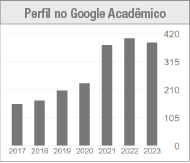Policies of the Thematic Dossier
- This section is composed of unpublished articles, relevant to the thematic area of the journal and the referred dossier, whose theme may be proposed by any member of the Editorial Team, interested researchers, duly justified and related to the performing arts.
- The Editorial Board of the Thematic Dossiers must be composed of at least four (4) proponents. All of them must be registered in the Urdimento website.
- Proposals must present:
- Abstract of the theme;
- Itemized detail of the theme;
- Link to the ORCID of the proponents.
- E-mail of the proponents
- The proposal is reviewed by the Editor-in-Chief and Associate Editors.
- After approval by the Editorial Board, the proposed Thematic Dossier must be sent, in the Urdimentoformat, in Portuguese, English and Spanish, accompanied by an image for the elaboration of the flyer for publicizing the work.
- The Editor-in-Chief may encourage the organizers of the thematic dossiers to belong to different teaching and research institutions located in different states of the country.
- The articles submitted to the thematic dossiers will be evaluated exclusively by the members of the specific Editorial Committees of each dossier. They will be submitted to a double-blind evaluation system (peer view).
- The Editorial Committee of the Thematic Dossier may submit articles to the proposing Dossier as long as this person is not the evaluator of your work. And your article counts in the total amount of texts that can compose a Thematic Dossier.
Thematic Dossiers can be composed of:
- A maximum of 10 unpublished articles (Dossier Section);
- One (1) unprecedented debate linked to the dossier theme (Debates Section);
- One (1) unpublished theatrical text linked to the theme of the dossier (Dramaturgy Section);
- One (1) article-report (Section Reports).
Editorial activities must be developed in two stages:
A. First Step – Double-blind article evaluations 1. Evaluate and give an opinion on the texts sent to the Thematic Dossier by the OJS3 Platform.2. Check whether the author has complied with what was requested in the case of a request for corrections.
B. Second Step – Definition of the composition of the Thematic Dossier 1. Define the articles that will compose the Thematic Dossier, after their final approval by the dossier's editorial group. Remembering that even if more than the established limit are accepted, the final approved must be restricted to the total established above.2. Establish the sequence of texts that will compose the aforementioned dossier.3. Write the Editorial for the Thematic Dossier.4. The final texts, approved by the Editorial Committee, including the Editorial, must be sent by ......................., to the Editor-in-Chief of Urdimento .



